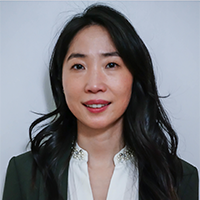 The industry event anyone in secured finance attends now celebrates its 77th year. SFNet is set to make the Arizona convention a memorable one. Click below to register.
The industry event anyone in secured finance attends now celebrates its 77th year. SFNet is set to make the Arizona convention a memorable one. Click below to register.

Teresa Chan
VP, Underwriting, White Oak Commercial Finance
Teresa Chan is vice president of underwriting at White Oak Commercial Finance (WOCF) where she is responsible for managing and servicing its portfolio clients. Teresa has been with the firm since 2011 and previously served in various departments of its factoring division where she learned all facets of asset-based lending before becoming a relationship manager in 2014. Teresa is dedicated to establishing strong and lasting partnerships to help businesses overcome complex challenges and her position has expanded to include sourcing and closing new deals, and she frequently contributes to White Oak’s marketing efforts. Her expertise includes such diverse areas as apparel, home goods, electronics as well all areas of E-comm business, a rapidly expanding area of focus for White Oak. She also serves as a role model and mentor for many of the younger associates at White Oak. She is widely respected not only for her lending expertise, but also for her team-first attitude. Teresa began her career at Doctors Without Borders where she served as a finance associate for six years. She earned her B.B.A in finance from Zicklin School of Business at Baruch College.
What advice would you offer to women just starting out in the industry?
Don’t be afraid to ask questions when you don’t have the answers and keep asking until you understand. It is also good to get the perspectives of different colleagues, as they have unique views that you can gain from. Women also need to learn to walk the fine line between standing up for themselves while not being viewed as overly aggressive. Stand by your decisions when you think you are right, while maintaining an open mind to others’ thoughts and ideas.
What role has mentoring played in your career?
I am very fortunate to have two great mentors during my career at White Oak Commercial Finance, namely Robert Grbic and Charles Sharf. Their doors are always open, and they take time to provide guidance based on their own knowledge and experiences. It is very important to have someone you can ask questions to privately who will take the time to explain in detail. I strive to follow in their footsteps to help future team members.
What do you enjoy most about your role? Least?
I enjoy being able to interact with clients on a daily basis and being able to help them in all areas of their business. The most satisfying moments are when a company has grown substantially, or turned around from a difficult situation, and they credit White Oak with being part of that success. It is a great feeling when you feel you have contributed to the success of others. The least favorite part of my job is probably the final stages of getting a deal across the finish line, but we have a great operating team to support us at every step and it is always satisfying when completed.
How do you balance work/personal time?
I work hard and will work later hours to meet deadlines or to complete time-sensitive projects, but I always make the time to take at least 1-2 international trips a year. It is important to “get away from the computer” and ensure that you have personal time, especially on the weekends. I think it is very helpful if you like where you work; White Oak has a very social culture and I consider many of my colleagues also my friends, and several of my best friends I have met through the industry.
What effect, if any, has working remotely had on your career and/or your industry? What have been the challenges and how have you worked to overcome them?
The most challenging thing for me working remotely is the absence of in-person interactions, whether it is with my peers or clients. Without the ability to engage face-to-face, we must settle with phone or Zoom calls, which has been working well under the circumstances.
What do you think work will look like in the post-pandemic world?
I think a lot of companies will move toward a hybrid workweek, at least to start when the world reopens. It will take a more time for the majority of people to be comfortable commuting to work after over a year of working remotely. By starting with a hybrid workweek, they will have the chance to ease back into it.
77th Annual Convention
 The industry event anyone in secured finance attends now celebrates its 77th year. SFNet is set to make the Arizona convention a memorable one. Click below to register.
The industry event anyone in secured finance attends now celebrates its 77th year. SFNet is set to make the Arizona convention a memorable one. Click below to register.
